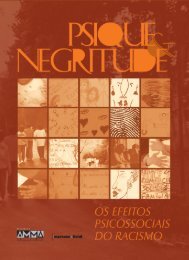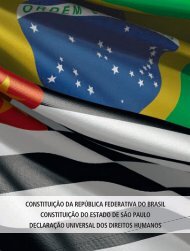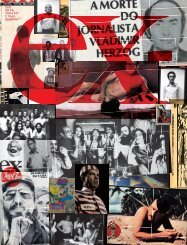CLÁSSICOS BRASILEIROS BRAZILIAN CLASSICS - Imprensa Oficial
CLÁSSICOS BRASILEIROS BRAZILIAN CLASSICS - Imprensa Oficial
CLÁSSICOS BRASILEIROS BRAZILIAN CLASSICS - Imprensa Oficial
Create successful ePaper yourself
Turn your PDF publications into a flip-book with our unique Google optimized e-Paper software.
Brazilian Classics<br />
A selection of authors with works in public domain<br />
90<br />
MARTINS PENA<br />
(1815 – 1848)<br />
Two fundamental aspects appear in Martins<br />
Pena, who is considered to be the founder of<br />
the Brazilian theater and comedy. Written in the<br />
middle of Romanticism, his work does not fit the<br />
canons of that movement, already tending to the<br />
realistic solutions, judging by the effort to portray<br />
quotidian types and habits. On the other hand,<br />
he was the first major Brazilian author to write<br />
only for the stage, at a time when others would<br />
see the theatrical creation as a kind of secondary<br />
branch in a more serious literature. Because of<br />
a verbal humor, including puns and games of<br />
words, his plays deflected from the Portuguese<br />
tradition, placing the emphasis on the Brazilian<br />
way of speaking, adopting popular expressions,<br />
and often restoring them to use by giving them a<br />
new roguery and more force. This comedy writer,<br />
whose plays are staged over and over again, always<br />
meeting absolute success, is regarded today as a<br />
full master, for his skill to deploy his scenes, for<br />
the way he arranges his effects and builds his<br />
dialogues. He is a caricaturist in words, whipping<br />
the society as he lays bare what is ludicrous in it.<br />
Review<br />
Main works<br />
Excerpt<br />
The novice<br />
AMBRÓSIO — In that room?<br />
MASTER — Yes, sir, and there he ordered us to<br />
wait in silence. He called the novice, and as soon<br />
as he left we rushed on him and forced him to<br />
follow us to the monaostery.<br />
AMBRÓSIO, scared - But to whom, sir, to whom?<br />
MASTER — To whom?<br />
FLORÊNCIA — What is this mess all about?<br />
AMBRÓSIO — Hurry up!<br />
MASTER — I got to the monastery, called at D.<br />
Abbot's office, bringing the novice in restraint,<br />
and then ... Ah!<br />
AMBRÓSIO — For God's sake, hurry up!<br />
MASTER — I still blush from shame. Then I<br />
realized it had been vilely deceived.<br />
AMBRÓSIO — But who was the novice under<br />
arrest?<br />
MASTER — A woman dressed as a friar.<br />
Brakeless tropicallty<br />
"Comedian Martins Pena is straightforward, because unintellectualized, requiring from the audience a participation that<br />
is rather sensorial than intellectual, and also because he handles resources of forthright effect, in spite of being obvious<br />
and constant. A comedian in the Brazilian style, prone to farce, to parody, to merrymaking, to the moderate sullenness of<br />
a society that, while fancying itself European, is agitated by fits of a brakeless tropicality. Humor of white joke, bursting<br />
into cheering-up, malicious laughter and, lasting but a fleeting instant, dies without consequences. A comedian who eases<br />
the stress, triggers those harmless revenges generated by nonconformism or rebellion contained desires."<br />
(Massaud Moisés, História da literatura brasileira)<br />
Um sertanejo na corte (1833-1837); O juiz de paz da roça (1842); O Judas em sábado de aleluia (1846); O cigano<br />
(1845); As casadas solteiras (1845); O noviço (1845); O namorador ou A noite de São João (1845); O caixeiro da<br />
taverna (1845); Os meirinhos (1845); Os ciúmes de um pedestre ou O terrível capitão do mato (1846); Os irmãos das<br />
almas (1846); O diletante (1846); Quem casa quer casa (1847).









